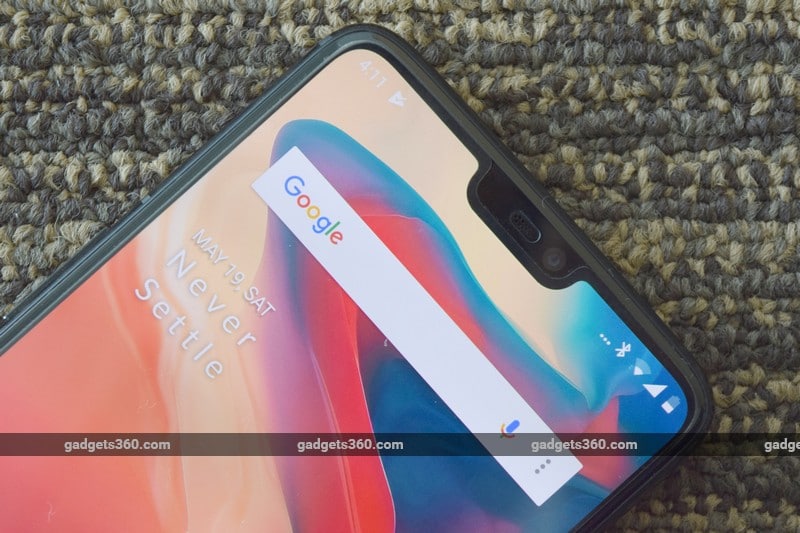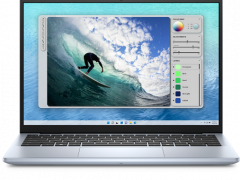- Home
- Mobiles
- Mobiles Reviews
- OnePlus 6 Review
OnePlus 6 Review

OnePlus 6 price in India starts at Rs. 34,999 for the variant with 6GB of RAM and 64GB of storage
Not too long ago, we were confused about companies releasing new top-of-the-line smartphones every six months. Sony was for a while the most prominent company to do this, and we feared that buyers would feel a little short-changed when their expensive phones wound up looking second-best so quickly. How times have changed, though! The six-month cycle is now practically obligatory in the Android world, and if sellers aren't constantly offering up the latest and greatest, they might as well not bother.
OnePlus seems to have embraced this philosophy whole-heartedly. It was just in November last year that the OnePlus 5T (Review) was released with the sole purpose of having an 18:9 screen, because that had become the defining look for smartphones and the OnePlus 5 (Review) wasn't going to cut it anymore. There was practically nothing else new or different about that phone. Now, the OnePus 5T is already out of stock and has vanished from the company's website.
What we have in its place is the new OnePlus 6, which brings a lot more than just a cosmetic update or minor bump in specifications. It has a new processor, new type of screen, and new design, and a few other tweaks and improvements. Surprisingly, it doesn't cost a lot more than the model it replaces. At launch time, OnePlus is selling this phone with 6GB of RAM and 64GB of storage at Rs. 34,999, with the 8GB RAM and 128GB storage variant priced at Rs. 39,999. There's also a Marvel Avengers edition with 8GB of RAM and 256GB of storage, but it will most likely not be available for long. If you're thinking of buying the OnePlus 6 right away, read on.
OnePlus 6 Design
As it has grown, OnePlus has become increasingly sophisticated in terms of its designs and manufacturing capabilities. The OnePlus 6 has a glass rear panel, and three distinct versions of the smartphone (plus the Marvel Avengers edition) will be available to buyers at launch time. The most common one will be the Mirror Black finish, which is also your only option if you choose the lower-priced Rs. 34,999 configuration. This is very much like what we've seen before from other companies. It's slick and has a high sheen. It's also a little slippery, and very reflective, which means it will pick up smudges as soon as you touch it. This is the one that we have for review today. The Marvel Avengers edition has the same shiny finish with a carbon fibre pattern.
The Midnight Black option doesn't even really look like glass at first. OnePlus calls the finish "corroded", and that's pretty accurate. It has a matte finish and looks quite stealthy. Everyone who sees it will want to touch it. If you hold it up to the light, you can see a refracted pattern in the glass. Then there's the Silk White finish, which will be available two weeks after the black options. This one has a contrasting rose gold frame, fingerprint sensor, and accents around the camera module. The glass back has a soft, smooth texture that OnePlus says was achieved by using actual pearl dust. Both Midnight Black and Silk White will only be available with the Rs. 39,999 configuration.
OnePlus has used Corning Gorilla Glass 5 on the front and rear of all OnePlus 6 variants. The three primary options look and feel different, and that's surprising for a company that relies so heavily on hands-off online retail. Buyers should definitely try to make their way to a physical shop or OnePlus popup event near them to check all options out for themselves before making a decision. You won't be able to show your phone off if you're using a cover (you get a basic plastic one in the box), which is a pity.
![]()
The thing you should notice first about the front of the OnePlus 6 is the notch, but unfortunately there's a pre-applied adhesive screen protector that in our opinion completely ruins the look of this phone. The screen is supposed to look nearly borderless, but instead there's a clearly defined line running around it; all the more noticeable because of the cutout at the top. It shouldn't even be necessary with Gorilla Glass 5.
OnePlus is quick to point out that pushing all the electronics above the screen into a notch hasn't meant ditching a notifications LED, because fans apparently really love this feature. The alert slider is also still very much there, but it's now on the right instead of the left. The behaviour of this control has changed, so it switches between Ring, Vibrate, and Silent rather than being linked to Android's Do Not Disturb feature.
The camera module at the back is now in the centre again, and has a rough, scratchy rim. This is a problem that the OnePlus 5 had but it was fixed with the 5T, so we're surprised to see it return. The vertical arrangement of the two cameras means that the fingerprint sensor is a bit too low for our liking. At least the power and volume buttons are within easy reach. There's a dual-SIM tray on the left. On the bottom, you'll find a single mono speaker, a USB Type-C (2.0) port, and a 3.5mm headphones socket which is sure to be a relief to many buyers.
This phone is comfortable to hold, thanks to the curved glass rear, but in addition to our Mirror Black unit being slippery, we found it hard to reach all corners of the newly enlarged screen. At 177g, it's on the the heavier side too. The overall construction quality is excellent, and while OnePlus does use the term "water resistant", there's no official IPxx rating for protection from water or dust ingress.
![]()
OnePlus 6 specifications and software
The first phones to feature Qualcomm's new top-end Snapdragon 845 SoC were announced at MWC earlier this year, but OnePlus has beaten them to the punch in terms of actually going on sale in India. This gives the company a huge advantage, even if it's a temporary one. This SoC has eight Kryo 385 cores, integrated Adreno 630 graphics, improved security and image processing subsystems, a faster LTE modem, and even hardware dedicated to AI processing.
Because of the notch and its "ears", the screen now measures 6.28 inches diagonally, up from 6.01 inches on the OnePlus 5T. There's a display setting that lets you mask the notch, and we didn't have trouble with any fullscreen apps. The resolution is 1080x2280, which is well below the QHD resolutions of today's major-brand flagships - but that difference is hardly perceptible, and you're unlikely to feel like you're losing out on anything.
Like we mentioned earlier, you can can choose to buy this phone with either 6GB of RAM and 64GB of storage for Rs. 34,999, or 8GB of RAM and 128GB of storage for Rs. 39,999. The Marvel Avengers Limited Edition is the only variant in India with 256GB of storage, which is a pity because it will undoubtedly sell out quickly.
There are two Nano-SIM slots, but no microSD card slot for storage expansion. OnePlus officially supports dual standby for VoLTE using two SIMs, which will disappoint some people. You also get Bluetooth 5.0 with aptX HD, NFC, GPS, GLONASS, and multiple sensors including a gyroscope. The battery capacity is 3300mAh, and while you do get a huge 5V 4A Dash Charger in the box, wireless charging isn't supported.
![]()
OxygenOS is a huge differentiator for OnePlus. It's based on Android 8.1, and we received an OTA update with the latest May 2018 security patch during our review period. OxygenOS is nearly identical to stock Android on the surface but has a number of useful additions such as shortcuts, a dark theme, and a scrolling screenshot capture tool. There's a lot to discover within the Settings app, including controls for giving the on-screen buttons additional functions, night and reading modes, a choice of system fonts, and configurable colours for the notification LED.
One very interesting feature is an optional gesture scheme that lets you get rid of the Android navigation buttons altogether. A short swipe up from the bottom-centre takes you to the home screen from within any app, or continuing the swipe upwards takes you into the app switcher. To go back, you just have to swipe upwards on either side of the screen. It takes a lot of getting used to, and in our opinion, this feature is more about keeping up with the competition than making any meaningful improvement to usability. It remains to be seen what OnePlus will do once Android P is released with its own gesture scheme.
There's also a Gaming Mode that not only suppresses non-essential notifications, but can also limit background apps' Internet usage, which can make a difference in online games. You can even route calls directly to the loudspeaker so you don't have to stop playing.
Of course face recognition is supported, and it's very quick most of the time. The phone often unlocked itself before the lock screen could even be shown, which was actually annoying when all we wanted to do was glance at our notifications or swipe open the camera app. Unfortunately, recognition fails in low light and also under very bright sunlight.
![]()
OnePlus 6 performance and battery life
Other than gaming, it's hard to define use cases that will really stress the Snapdragon 845 processor. VR and AR apps aren't mainstream yet, and heavy content creation tasks aren't suited to smartphones anyway. In our real-world experience, we found the OnePlus 6 to be extraordinarily snappy, and we never had to pause for apps to load. With 8GB of RAM at our disposal, it shouldn't be surprising that apps stayed ready to go even after lying unused for a full day. That said, most people would still be perfectly happy with what today's phones at well under half this price are capable of.
Benchmarks might not reflect real-world situations in this case, but they do let us understand how much power there is to tap. AnTuTu gave us a record-breaking score of 268,385, while the single- and multi-threaded Geekbench scores were 2,389 and 9,013 respectively. 3DMark Slingshot Extreme managed 4,642 points. GFXBench's Manhattan and Car Chase gaming simulations ran at 54fps and 32fps respectively. Many of these scores exceed those of the Samsung Galaxy S9 and S9 Plus - though graphics tests favour the OnePlus 6 because its lower resolution screen is easier to fill up.
We spent quite a lot of time running some of today's most demanding games. PlayerUnknown's Battlegrounds is growing increasingly popular, so OnePlus fans will be happy to know that it automatically selected the High quality preset and also allowed us to turn on HDR and antialiasing without breaking a sweat.
When it comes to entertainment, you'll be quite happy with the OnePlus 6. The AMOLED screen is vivid, with punchy colours and great viewing angles. Videos looks great, though the Default screen calibration mode seems to be deliberately oversaturated. You can choose between Default, sRGB, DCI-P3, and Adaptive modes, or even set your own custom colour temperature if you prefer. On the downside, there's only a mono speaker and it's very easy to block when holding the phone in landscape. Sound is surprisingly loud and actually has some body to it, but there's distortion at high volumes.
Battery life was good when we used the phone normally, which involved day-to-day use as well as a few hours of gaming and streaming videos. We got through our day with about 20 percent left at the end, which means we didn't have any anxiety about running out of power. One big annoyance is that there's no way to see the battery level percentage in the status bar, most likely thanks to the notch, but you can swipe down to see it in the quick settings panel.
Our HD video loop ran for only 10 hours, 59 minutes which was a surprisingly poor showing. We're giving OnePlus the benefit of the doubt here, because our real-world experience was much better. The huge Dash Charger takes the phone up from zero to just over 50 percent in half an hour, and gives you a full charge in around an hour and a half.
![]()
OnePlus 6 cameras
OnePlus is boasting of several improvements to its cameras. Most importantly, the primary 16-megapixel rear sensor gets optical image stabilisation, which fans have been demanding for a while. The sensor is also claimed to be 19 percent physically larger, allowing for more light to be captured, which should mean better detail and sharper shots. The secondary 20-megapixel camera is supposed to be used in low light and for depth effects.
Most of our shots came out looking good, but we weren't blown away. Daylight shots had a slightly warm tone, though to be fair most were taken on exceptionally sunny Mumbai summer days. Colours popped nicely and close-up subjects were handled well. Details and textures at a slight distance were not very realistic, and possibly overprocessed in software. The phone even managed to do a decent job when shooting subjects against the light. The portrait mode was slightly disappointing, taking a few seconds to isolate subjects from even simple backgrounds.
Low-light performance really stood out. Even on an unlit street, we were able to take shots that captured a lot of colour and detail, where lesser phones would have produced noisy grey blotches. There's a bokeh lens effects mode that distorts points of light into hearts or stars, which can look pretty cool. It only works if you have points of in the background against a dark foreground, so it can be challenging to set up such shots. A software bokeh mode for the front camera is promised for a future OxygenOS update.
![]()
![]()
![]()
![]() Tap to see full-size OnePlus 6 photo samples
Tap to see full-size OnePlus 6 photo samples
Speaking of the front camera, it's quite ordinary. You'll be happy enough with the results to share them online. As seems to be the norm these days, the OnePlus 6 ships with a beautification mode that is - thankfully - disabled by default. The camera app has no other filters, effects or stickers, which is a relief to us but will disappoint many people. You also get a pro mode with manual controls and a live histogram. There is also a zoom toggle on the viewfinder, but you don't get true optical zoom. Other phones have secondary cameras with zoom or wide lenses, which give you more creative framing options.
Video recording now goes up to 60fps at 4K (with a five-minute time limit), and our video samples did look extremely smooth. 4K 30fps clips are capped at ten minutes, and the only time we felt this phone getting hot was when recording 4K video. Even our 1080p video samples looked very good, with no focus hunting or jerky motion. There's a new super-slow-motion mode that lets you take 480fps footage 720p for one minute. Other phones with the Snapdragon 845 and similar processors go up to 960fps, so that's a minor omission.
Verdict
As before, OnePlus offers a huge number of features at prices that make big-name brands look quite out of touch. One of the biggest surprises about this phone is that it's only marginally more expensive than its predecessor, despite the new screen, SoC, and glass body. Of course you don't get absolutely everything that the iPhone X (Review), Samsung Galaxy S9+ (Review), and Sony Xperia XZ2 promise. Compared to these current flagships, the OnePlus 6's biggest omissions are wireless charging, an IP-rated weatherproof body, a high-res or HDR screen, stereo speakers, 3D face or iris recognition, AI enhancements, 960fps slow-motion, and HDR video recording.
The question then is how many of these features really matter enough for you to want to spend up to twice as much on one of those other phones? Sure, they'd be nice, but are you really missing out on something significant? The OnePlus 6 is still good-looking, well crafted, extremely powerful, and fully capable of doing what most people want their phones to do.
When compared to other phones at its own price level, the camera performance on the OnePlus 6 is not exactly groundbreaking, and battery life could of course have been better. Then there's the Mirror Black option at the Rs. 34,999 price point, which might be seen as a deliberate move to make the higher priced variant seem more tempting. However, even at Rs. 39,999, this is the only option with a Snapdragon 845 right now. The software is both versatile and up-to-date which are both significant if longevity is important to you. This is also a phone you can show off quite proudly. We think that most people, especially OnePlus fans looking for an upgrade, will be quite satisfied with the OnePlus 6.
Is OnePlus 6 an iPhone X killer at half the price? We discussed this on Orbital, our weekly technology podcast, which you can subscribe to via Apple Podcasts or RSS, download the episode, or just hit the play button below.
Catch the latest from the Consumer Electronics Show on Gadgets 360, at our CES 2025 hub.
Related Stories
- Samsung Galaxy Unpacked 2025
- ChatGPT
- Redmi Note 14 Pro+
- iPhone 16
- Apple Vision Pro
- Oneplus 12
- OnePlus Nord CE 3 Lite 5G
- iPhone 13
- Xiaomi 14 Pro
- Oppo Find N3
- Tecno Spark Go (2023)
- Realme V30
- Best Phones Under 25000
- Samsung Galaxy S24 Series
- Cryptocurrency
- iQoo 12
- Samsung Galaxy S24 Ultra
- Giottus
- Samsung Galaxy Z Flip 5
- Apple 'Scary Fast'
- Housefull 5
- GoPro Hero 12 Black Review
- Invincible Season 2
- JioGlass
- HD Ready TV
- Laptop Under 50000
- Smartwatch Under 10000
- Latest Mobile Phones
- Compare Phones
- Poco X7 Pro 5G
- Poco X7 5G
- Nubia Music 2
- OnePlus 13R
- Moto G05
- Oppo Reno 13F 4G
- Oppo Reno 13F 5G
- Huawei Nova 13i
- Lenovo Yoga Slim 9i (2025)
- Lenovo ThinkPad X9 15 Aura Edition
- Honor Pad X9 Pro
- Honor Pad V9
- Amazfit Active 2
- boAt Enigma Gem
- Sony 65 Inches Ultra HD (4K) LED Smart TV (KD-65X74L)
- TCL 55 Inches Ultra HD (4K) LED Smart TV (55C61B)
- Sony PlayStation 5 Pro
- Sony PlayStation 5 Slim Digital Edition
- Blue Star 1.5 Ton 3 Star Inverter Split AC (IC318DNUHC)
- Blue Star 1.5 Ton 3 Star Inverter Split AC (IA318VKU)


















